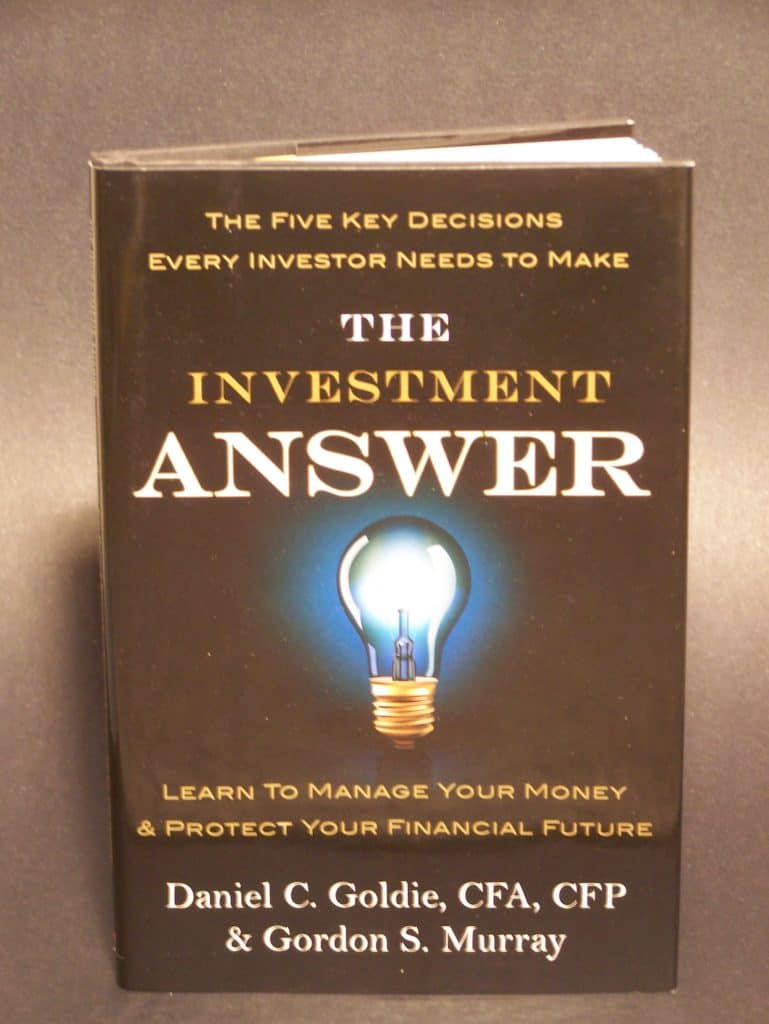
Book Summary – The Investment Answer

The Investment Answer: Learn to Manage Your Money and Protect Your Financial Future
By Daniel C. Gordy and Gordon S. Murray
Too many people overcomplicate the topic of investing. Recognizing this, Gordy and Murray have pulled together a brief, concise text that walks individuals through the key decisions that individuals need to make in order to be successful.
Gordy and Murray suggest that there are five key decisions that individuals need to make:
- The Do-It-Yourself Decision – Should you try to invest on your own or seek the help from an investment professional? And if so, which type of advisor is best?
- The Asset Allocation Decision – How should you allocate your investments among stocks (equities), bonds (fixed income), and cash (money market funds)?
- The Diversification Decision – Which specific asset classes within these broad categories should you include in your portfolio, and in what proportions?
- The Active Versus Passive Decision – Should you favor an actively managed approach to investing that seeks to outsmart the market, or a more passive approach that delivers market-like returns?
- The Rebalancing Decision – When should you sell certain assets in your portfolio and when should you buy more?
Gordy and Murray provide some great guidance on each of the above topics. Some of the key recommendations that they offer include:
- Independent, fee-only advisors are always legally required to act as fiduciaries to their clients
- An advisor is a fiduciary who must put your interests ahead of his own
- A broker is working for his firm. An independent fee-only advisor is working for you
- There are no low risk/high expected return investments
- The primary driver of investment return is risk
- There are two reasons we recommend that you include bonds in your mix: your emotional tolerance for risk and your age
- The blended portfolio has lower volatility then either individual asset
- Focus on the performance of your portfolio as a whole, rather than the return of its individual components
- No investor will consistently beat the market over long periods except by chance
- Markets work because no single investor can reliably profit at the expense of other investors
- A more sensible approach to investing is passive investing
- Active managers must always underperform passive managers
- Rebalancing is an automatic way to buy low and sell high, without your emotions getting in the way
I could not agree more with these five key decisions and the insights offered by the authors. In my opinion every investor should be able to clearly answer these questions BEFORE they invest their first dollar.
The authors also offer a couple of additional perspectives on topics related to but beyond these five key decisions:
- Diversity is not diversification
- Exclusive is not necessarily excellent
- Hedge funds are often higher in cost, less diversified, more leveraged, and less liquid
- Private equity is generally higher in cost, less diversified, more leveraged, and less liquid
- No share of any earnings stream is to be had with commodities
- You don’t need alternative investments in your portfolio to have a successful investment experience
They close with two key messages:
- With capitalism there is a positive return on capital
- Everyone who takes the time to address these five investment decisions can have a successful investment experience
At only 85 pages, the text is a quick read and I’d definitely recommend you pick up a copy if you have a chance. If you are having difficulty finding a copy, drop me an email and I’ll let you borrow a copy of mine!
If you would like to have a copy of this summary in PDF form to share with others you can click here
If you liked this post, you might want to check out these as well:


